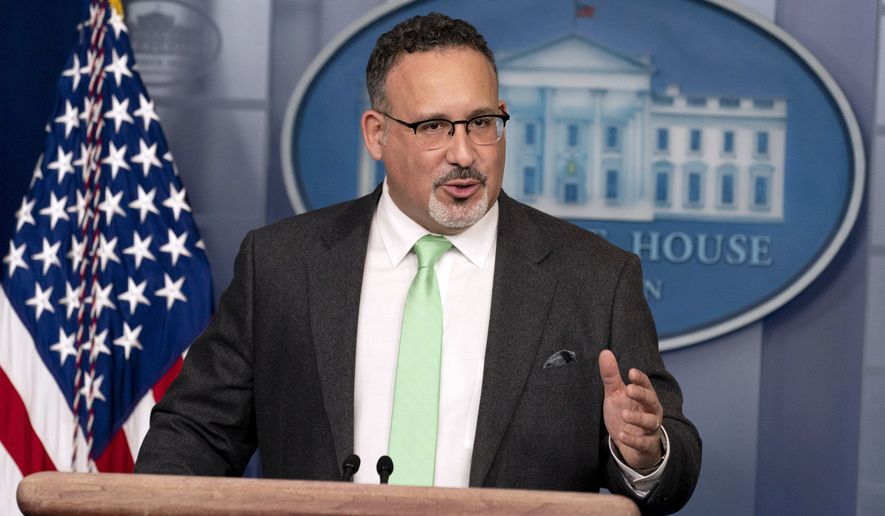Education Secretary Miguel Cardona on Friday backed off from his proposal to create a new grant that was seen as encouraging the teaching of critical race theory and the “1619 Project.”
Mr. Cardona’s decision came after the department received more than 35,000 comments on the proposed grants, with most of the comments objecting to grants to promote teaching U.S. history through the prism of race and highlighting the impact of slavery.
In a blog post, Mr. Cardona announced that the department would go forward with the creation of the new federal grants but the grants would not require classwork based on critical race theory or the “1619 Project.”
In the grant proposal, as an example of what should be taught to receive the grant, the department cited The New York Times’ “1619 Project,” which reframed U.S. history with slavery and racism as the centerpiece of the American experience.
Mr. Cardona insisted said the grants never dictated what should be taught. He said the grant would still seek to improve the quality of U.S. history and civics lessons.
“This program, however, has not, does not, and will not dictate or recommend specific curriculum be introduced or taught in classrooms,” Mr. Cardona emphasized. “Those decisions are — and will continue to be — made at the local level.”
Rep. Virginia Foxx of North Carolina, the top Republican on the Education Committee, said the thousands of protests had persuaded Mr. Cardona to change course.
“Let me be clear: the Department of Education changed its approach to grant funding because parents, students, and Republican leaders stood up in defense of our nation’s history and legacy,” she said in a statement.
“While I am doubtful that Secretary Cardona plans to abandon the administration’s crusade to push Critical Race Theory in our public schools, I applaud the move not to give overt preferential treatment to federal grant applicants seeking to advance anti-American agendas,” she said.
In the blog post, Mr. Cardona said the aim of the grants would be “to improve the quality of American history, civics, and government education to provide more students the opportunity to learn about the rich history of our nation and build the skills needed to fully participate in civic life.”
The grant still “encourages projects that incorporate racially, ethnically, culturally, and linguistically diverse perspectives into teaching and learning,” he wrote.
Mr. Cardona set off fierce criticism in April with the proposal of the grant that he said would promote, in part, teaching about slavery.
“There is growing acknowledgment of the importance of including, in the teaching and learning of our country’s history, both the consequences of slavery and the significant contributions of Black Americans to our society,” the proposal said. “This acknowledgment is reflected, for example, in the New York Times’ landmark ‘1619 Project’ and in the resources of the Smithsonian’s National Museum of African American History.”
Amid the criticism, Mr. Cardona tried to back off from the idea he was trying to dictate what schools teach. The department said it mentioned the “1619 Project” only to offer an example of what it envisioned.
The project won a Pulitzer Prize last year but became a flashpoint in the debate over racial justice, cancel culture, and what American children are taught about their country.
Critics objected to the emphasis it put on the role of slavery in the nation’s history and for historic inaccuracies. One prominent inaccuracy, which was later retracted, was the claim that the Founding Fathers’ prime motivation for fighting the American Revolution was the fear that Great Britain would end slavery.
The teaching in schools of critical race theory, which emphasizes the idea that America’s laws and institutions discriminate against Black people and people of color, has ignited emotional protests around the country.
• Kery Murakami can be reached at kmurakami@washingtontimes.com.




Please read our comment policy before commenting.